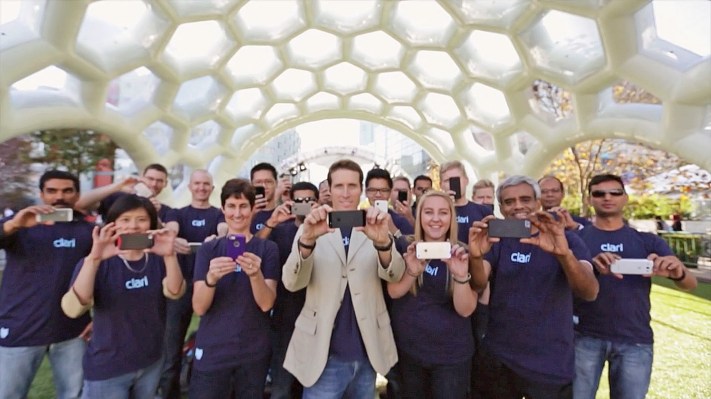CRM behemoths like Salesforce and Oracle, and more mature startups like Domo, have made some significant inroads into mobile and specifically apps for mobile salespeople, but a new startup believes that its streamlined, mobile-first solution can do it better. Clari, a mobile-first sales productivity tool that leverages real-time big data analytics to help salespeople do business, is emerging out of stealth today with $6 million in funding from Sequoia Capital and a list of “dozens” of customers that includes VMware, Juniper, Cisco, Box, and Nimble Storage along with several other Fortune 500 names.
According to CEO and founder Andy Byrne, the key to what Clari does that’s different from its much-bigger competitors is that it focuses on helping salespeople sell better rather than report what they have been doing better.
This is a crucial shift: the former means that information is delivered to people on their devices right when they need it; the latter implies that while new sales information may still get recorded or even used by a mobile worker, the actual information crunching that produces actionable data happens back when you’re at your desk, or perhaps by someone else entirely.
Like many a startup, the concept for Clari’s came out of Byrne trying to solve challenges elsewhere. At a previous company, Byrne tells me, “We saw that selling that we experienced was incredibly hard. CRM productivity was hard. There were too many application silos, and a lot of ‘black magic’ in how things were done, We felt there was a massive opportunity to address these pain points, and we were excited to explore how the BYOD trend and mobile eating up the enterprise could play into it.”
For Clari, its approach to solving this problem translates into some interesting features.
They include a cloud-based service that effectively mines and then crunches data from sales platforms and other platforms based on terms that you enter: current integrations include CRM systems (yes, like Salesforce’s), Sharepoint, Exchange, Box, Dropbox, LinkedIn, Gmail, news and Twitter.
There is also a “Deal assistant” — effectively a Samantha-like equivalent for the world of sales that lets workers input information by voice.
Clari also has something it refers to as “CRM accelerators”. These come in the form alerts pushed to workers as they leave meetings to help them better manage their feedback from them, and to suggest other sales threads that may need to be followed up.
There is also a “deal progression dashboard” — the kind you imagine exists on many a whiteboard in a sales office, now kept in the cloud with significantly more information and links within it.
You can see a demo of how these different features work here. The company also launched during the Demo Enterprise event this week in San Francisco.
There are a few interesting trends that Clari highlights:
The first is how “big” and mainstream big data applications have become. Once the terrain of data scientists or engineers who knew how to create and parse searches in specific computing languages, which were then passed on to others for further insights, we’re increasingly seeing applications for enterprises trickling down that let non-technical employees also tap into some of this data more directly. (Another company that’s part of this trend, for example, is Origami Logic for marketing teams, and Looker in business intelligence.)
The second trend is how far the industry has come in terms of startups’ credibility: Clari has not only made its way into meetings with larger enterprises, but managed to score their business.
The need to build up a paying client base was actually one of the main reasons that Clari has been in stealth until now — a trend common with other enterprise startups. “I am a relatively conservative person,” Byrne told me. “We wanted to have marquee customers before launching. Having customers there, it’s nice to have those proof points.”
(I didn’t ask, but I’m assuming their sales people used the Clari app to help them along.)
The third trend is the perennial importance of coming to the table with a world of experience behind you.
You might wonder why Sequoia bet early on Clari, and the answer in part comes down to executives like Bryne. Before Clari, among his other past roles, he was a long-time part of the executive team at Clearwell, which was eventually acquired by Symantec. (Clearwell too was focused on “discovery” of digital data, much like Clari helps salespeople better mine and discover insights.) Before that, he was a co-founder of Timestock, acquired by Wily and then subsequently Computer Associates.
“This is company number-four with Sequoia,” he tells me. In other words, Byrne and his execution skills are known quantities both to investors, and eventually early customers.
As part of this latest investment, Sequoia partner Aaref Hilaly (who had once been CEO of Clearwell) is joining Clari’s board. Clari has to date raised $9 million, including $3 million from previous backers.
